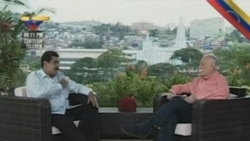WASHINGTON —
Venezuela's Acting President Nicolas Maduro has been making unsubstantiated accusations against Washington, also accusing the United States of plotting to kill Venezuela's opposition candidate for president. Maduro's allegations are being interpreted as campaign rhetoric for now. But there is growing concern they could incite political violence and further damage relations with the United States.
Maduro contends Washington has been plotting to assassinate opposition leader Henrique Capriles, and has specifically named two former U.S. officials as part of the alleged conspiracy. They worked in the Bush administration, but are not current U.S. government employees.
“I’m addressing President Obama and Roger Noriega and Otto Reich, Pentagon officials and the CIA. They are behind a plan to kill the presidential candidate of the Venezuelan right wing, to create chaos in Venezuela,” said Maduro.
The U.S. State Department has dismissed the accusation.
"The United States categorically rejects allegations of any U.S. government involvement in any plot to destabilize the Venezuelan government or to harm anyone in Venezuela," said State Department Spokeswoman Victoria Nuland.
And so, too, does former Assistant Secretary of State Roger Noriega, now an analyst at the American Enterprise Institute.
“I don’t have any relation with the U.S. government. I was an administration official in the past, and really I have been quite critical of the current administration,” said Noriega.
Cynthia Arnson, a Latin American analyst at the Wilson Center in Washington, said that Maduro's accusation is similar to those made by President Hugo Chavez during election cycles.
“We have seen in the past the use of the international threat from the United States of imperialism to maintain a united Chavista base,” said Arnson.
Noriega offers his own theory. He said that Maduro, with help from Cuba, may raise the threat of U.S. intervention to sanction political violence against his opponents.
“My concern is that maybe Maduro, or I should say his Cubans who are manipulating the succession in Venezuela, are signaling the possible use of political violence in Venezuela,” he said.
Arnson said the Obama administration should be cautious.
“Maintain silence for now. Don’t say too much. Don’t be a factor in the electoral campaign in Venezuela. This is what has been the strategy for a long time, including in 2012, and they should continue like this,” said Arnson.
And if the situation does not deteriorate, she said that after the election there still might be an opening for the U.S. and Venezuela to repair their relationship.
Maduro contends Washington has been plotting to assassinate opposition leader Henrique Capriles, and has specifically named two former U.S. officials as part of the alleged conspiracy. They worked in the Bush administration, but are not current U.S. government employees.
“I’m addressing President Obama and Roger Noriega and Otto Reich, Pentagon officials and the CIA. They are behind a plan to kill the presidential candidate of the Venezuelan right wing, to create chaos in Venezuela,” said Maduro.
The U.S. State Department has dismissed the accusation.
"The United States categorically rejects allegations of any U.S. government involvement in any plot to destabilize the Venezuelan government or to harm anyone in Venezuela," said State Department Spokeswoman Victoria Nuland.
And so, too, does former Assistant Secretary of State Roger Noriega, now an analyst at the American Enterprise Institute.
“I don’t have any relation with the U.S. government. I was an administration official in the past, and really I have been quite critical of the current administration,” said Noriega.
Cynthia Arnson, a Latin American analyst at the Wilson Center in Washington, said that Maduro's accusation is similar to those made by President Hugo Chavez during election cycles.
“We have seen in the past the use of the international threat from the United States of imperialism to maintain a united Chavista base,” said Arnson.
Noriega offers his own theory. He said that Maduro, with help from Cuba, may raise the threat of U.S. intervention to sanction political violence against his opponents.
“My concern is that maybe Maduro, or I should say his Cubans who are manipulating the succession in Venezuela, are signaling the possible use of political violence in Venezuela,” he said.
Arnson said the Obama administration should be cautious.
“Maintain silence for now. Don’t say too much. Don’t be a factor in the electoral campaign in Venezuela. This is what has been the strategy for a long time, including in 2012, and they should continue like this,” said Arnson.
And if the situation does not deteriorate, she said that after the election there still might be an opening for the U.S. and Venezuela to repair their relationship.






